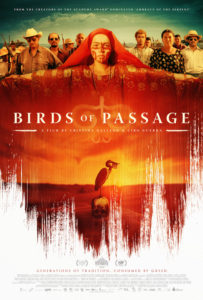Film Review: If “Birds of Passage” Doesn’t Quite Soar, It Mostly Gets Well off the Ground
Written by: Christopher Llewellyn Reed | March 1st, 2019

Birds of Passage (“Pájaros de verano”) (Cristina Gallego/Ciro Guerra, 2018) 2½ out of 4 stars.
“Based on true events” reads a title card at the beginning of Birds of Passage, a new drug-war epic, set among the Wayúu people of northern Colombia, from directors Cristina Gallego (first feature) and Ciro Guerra (Embrace of the Serpent), and indeed, much of what happens on screen bears the mark of ethnographic verisimilitude. Gallego and Guerra plunge us headfirst into the culture of the story’s time and place with great attention to detail, helped along by their mostly indigenous cast. Though the narrative is otherwise nothing we haven’t seen before (gangsters rise, but they always, eventually, fall), there is enough here that feels fresh to propel the viewer past the more familiar sections. Birds of passage occasionally discover new routes, and when they do, the thrill of the unexpected makes the new journey worth the effort.
The time is initially the late 1960s, and penniless Rapayet – who goes by Rafa –is looking for a wife. He sees her in Zaida, just emerging from a one-year pre-adulthood confinement as the film begins. Her family, however, led by daunting matriarch Úrsula, imposes a hefty dowry requirement on the young man. While doing odd jobs with his “alijuna” (i.e., non-Wayúu) pal Moisés (also Moncho), Rafa meets American tourists looking for marijuana, and quickly decides on a get-rich-quick scheme to raise the funds he needs to marry Zaida. With the help of an older cousin, he sells fine native weed to the foreigners, making a tidy sum in the process. And so, a drug dealer – and not just a husband and family man – is born. What could go wrong?

Quite a lot, as anyone who has ever seen The Godfather and its kin can tell you. But the fun is in the specificity, and of that we are served plenty. Beautifully photographed and with terrific performances all around, including, but not limited to, those from leads José Acosta, Carmiña Martínez and Natalia Reyes (who, unlike the others, is not Wayúu), Birds of Passage rises, if not quite soars, above its conceit, at least until the end when the expected bloodbath breaks out. Still, with its elliptical dream sequences and mystical asides, the film is sometimes a work of rare beauty, never without visual interest, even if embedded in a tired narrative. Not quite a diamond in the rough, perhaps, but something sparkly.
In Wayúu and Spanish (and occasionally English), with English subtitles

